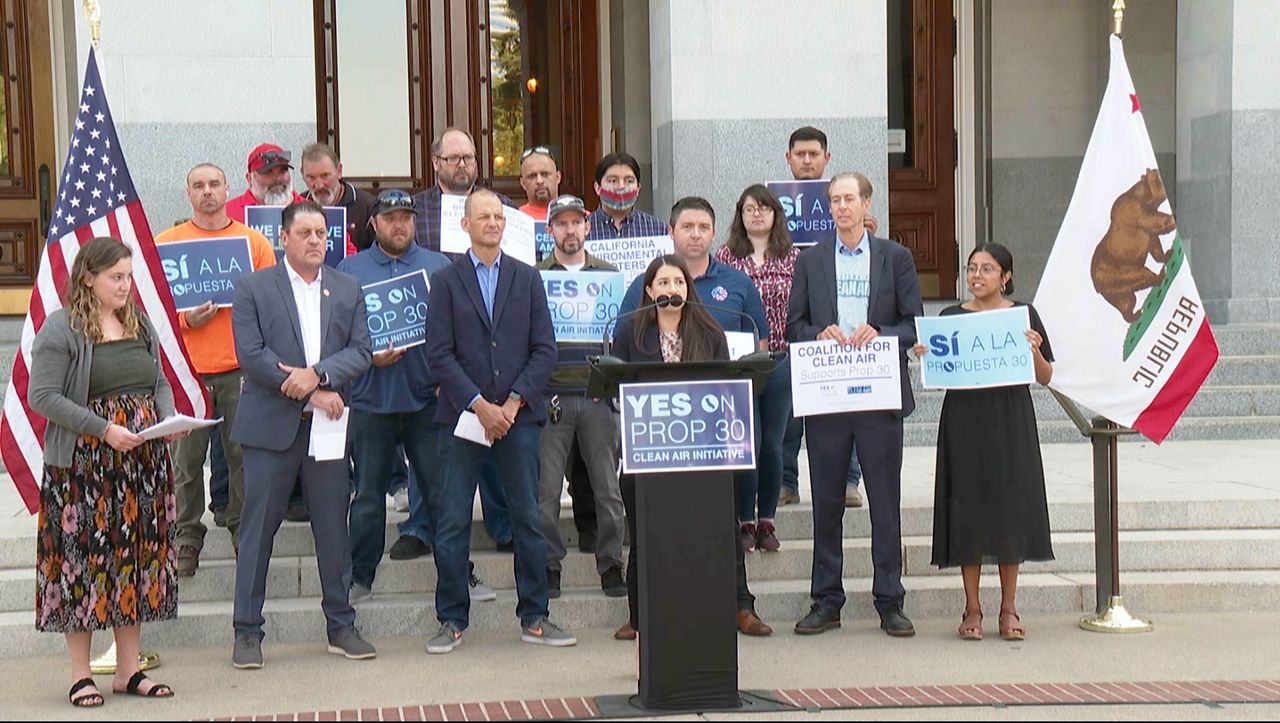SACRAMENTO, Calif. — California over the past few years has dealt with destructive wildfires and hazardous air quality conditions due to climate change. Legislative and environmental leaders held a press conference outside the State Capitol on Thursday to campaign for Proposition 30, which advocates say would address these issues.
Proposition 30 would increase taxes by 1.75% on individuals and married couples with an income greater than $2 million. The money generated by this tax will go into the Clean Cars and Clean Air Trust Fund.
Eighty percent of those funds will then go toward electric vehicle production and infrastructure. The remaining 20% would be set aside for wildfire protection and prevention.
A recent executive order by Gov. Gavin Newsom has mandated that all cars sold in California be zero-emissions by 2035. Assembly member Kevin McCarty (D-Sacramento, 23rd district), a supporter of Proposition 30, said while the action is a step forward it’s going to take a lot of time to implement.
“We’ve put a lot of money toward EV infrastructure, but it’s not nearly enough. Transitioning to clean cars throughout California will take several years and millions and millions of dollars more than we currently have and Prop 30 is the answer to the riddle,” McCarty said.
The California Legislature has provided funding for climate change, but McCarty said Proposition 30 is necessary to provide ongoing funding.
“Many of the monies that we have put forward are one time, one time in nature. Prop 30 gives an ongoing revenue stream to make sure that we tackle the issue for the next generation,” McCarty said.
A majority of the funding is going to electric vehicle infrastructure. Proposition 30 will also provide funding for wildfire prevention to help prevent fires like the Mosquito Fire, which has already burned nearly 65,000 acres and is the largest California wildfire so far in 2022.
“The climate in California is different today than it was when I started my career 15 years ago. We used to call it a fire season, we now refer to it as a fire year, as fires burn in summer, fall, winter and spring months,” Cal Fire Battalion Chief John Byrne said.
Byrne, the union chapter director for Cal Fire Local 2881, noted the ongoing fires have impacted how firefighters can implement fire protection and fuel management.
Byrne explains fire stations across California are understaffed and overworked. Last year, he said, firefighters looking for help placed over 20,000 phone calls to the mental health program.
“We are at a point where mental health has become a crisis. We struggle to do the job that we love, not knowing when we get to go home to our families,” Byrne said.
The funding provided by the measure will directly address the staffing issues with in Cal Fire. The California Legislative Analyst’s Office points out the proposition would increase wildfire response and prevention by around $700 million to $1 billion annually.
Fifty-five percent of Californians are likely to support Proposition 30, according to a survey by the Public Policy Institute of California.
Proposition 30 is not without opposition, as Gov. Newsom is strongly against the ballot measure. In a recent televised opposition ad, Newsom called Proposition 30 a "Trojan Horse." Newsom mainly opposes most of the support funding coming from the rideshare company Lyft. Lyft has so far contributed over $25 million to the Yes on 30 campaign.
“[Proposition 30] is a big tax increase that disproportionately affects one large corporation, a wonderful company, that’s going to be one of the lion share beneficiaries of raising everybody else’s taxes,” Newsom said at a recent press conference.
Newsom emphasized how the state has already dedicated $53.9 billion to fund the transition to electric vehicles and climate change.
“I just don’t think at this moment, with the economy tittering, with a $101.4 billion record surplus, that we should be raising taxes and sending [that] money to corporations to do something that the state is already doing at scale,” Newsom said.
Bill Magavern, the Coalition for Clean Air policy director, said the opposition is misguided when saying the bill will only to the benefit of a single corporation.
“What [the opposition] is telling you is that the measure will just benefit Lyft. In fact, it would benefit all Californians by helping us to breathe clean air, fight wildfires, and make that transition to zero-emissions transportation,” Magavern said.
Magavern, an author of the proposition, said the measure was designed by an environmental labor-business coalition and is supported by health, science, and environmental groups.
Let "Inside the Issues" know your thoughts and watch Monday through Friday at 8 and 11 p.m. on Spectrum News 1.



